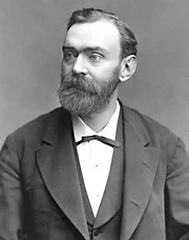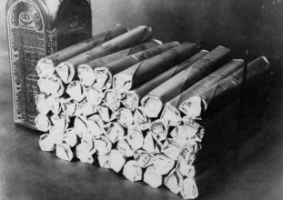  Alfred Nobel was an inventor, entrepreneur, scientist and businessman who also wrote poetry and drama. His varied interests are reflected in the prizes he established in 1895 when he wrote his last will, leaving much of his wealth to the establishment of the prize that would be named after him.
Alfred Nobel was an inventor, entrepreneur, scientist and businessman who also wrote poetry and drama. His varied interests are reflected in the prizes he established in 1895 when he wrote his last will, leaving much of his wealth to the establishment of the prize that would be named after him.Alfred Nobel (1833-1896) was born in Stockholm, Sweden in 1833. Nobel was a competent chemist by age 16 and was fluent in English, French, German, and Russian as well as Swedish. He was also very interested in social and peace-related issues, and held views that were considered radical during his time. Nobel began experimenting with explosives in a small laboratory. The only dependable explosive for use in mines at that time was black powder, a form of gunpowder. A recently discovered liquid compound called nitroglycerin was a much more powerful explosive, but was so unstable that it could not be safely handled. In 1862 Nobel built a small factory to manufacture nitroglycerin, and began researching a safe way to control the explosiveís detonation. In 1863 he invented a detonator using black powder that could safely detonate the much more powerful charge of liquid nitroglycerin. In 1865 Nobel invented an improved detonator called a blasting cap. This invention ushered in the modern use of high explosives. However, nitroglycerin remained difficult to transport, and extremely dangerous to handle. In fact, Nobelís nitroglycerin factory blew up in 1864, killing his younger brother and several other people. Undaunted by this accident, Nobel built several factories to manufacture nitroglycerin for use with his blasting caps. These factories were as safe as could be engineered at the time, but accidental explosions still occasionally occurred.  Nobelís second important invention was that of dynamite in 1867. By chance, he discovered that nitroglycerin was absorbed to dryness by certain materials, and the resulting mixture was much safer to use and easier to handle than nitroglycerin alone. Nobel named the new product 'dynamite' and was granted patents for it in Great Britain (1867) and the United States (1868). Dynamite established Nobelís fame worldwide and was soon put to use in blasting tunnels, cutting canals, and building railways and roads.
Nobelís second important invention was that of dynamite in 1867. By chance, he discovered that nitroglycerin was absorbed to dryness by certain materials, and the resulting mixture was much safer to use and easier to handle than nitroglycerin alone. Nobel named the new product 'dynamite' and was granted patents for it in Great Britain (1867) and the United States (1868). Dynamite established Nobelís fame worldwide and was soon put to use in blasting tunnels, cutting canals, and building railways and roads.
In 1875 Nobel invented a more powerful form of dynamite, 'blasting gelatin', which he patented the following year. By accident, he had discovered that mixing a solution of nitroglycerin with a fluffy substance known as nitrocellulose resulted in a tough, plastic material that had high water resistance and greater blasting power than ordinary dynamite. Alfredís interests in explosives, along with his own holdings in his brothersí companies in Russia, brought him a large fortune. In 1893 he became interested in Swedenís arms industry, and the following year he bought an iron works at Bofors, near Varmland, that became the nucleus of the well-known Bofors arms factory. Besides explosives, Nobel made many other inventions, such as artificial silk and leather, and altogether he registered more than 350 patents in various countries.  Since 1901, the Nobel Prizes, established and funded by Nobel just before his death, have been honouring men and women from around the world. Each Nobel Prize of approximately one million dollars (US) is awarded annually, and is widely regarded as the most prestigious award given for intellectual achievement in the world. Prizes are conferred in six categories: physics, chemistry, physiology or medicine, literature, peace, and economics.
Since 1901, the Nobel Prizes, established and funded by Nobel just before his death, have been honouring men and women from around the world. Each Nobel Prize of approximately one million dollars (US) is awarded annually, and is widely regarded as the most prestigious award given for intellectual achievement in the world. Prizes are conferred in six categories: physics, chemistry, physiology or medicine, literature, peace, and economics.
Nobel is a village on the shores of Parry Sound, in Ontario, Canada. The small community is named after Alfred Nobel. During the First World War, Nobel Ontario was the home of two explosives factories: The British Cordite Limited and Canadian Explosives Ltd (CIL). Explosives and munitions were also produced at Nobel in World War II.   This small church in Nobel is where my wife and I were married in 1981. |